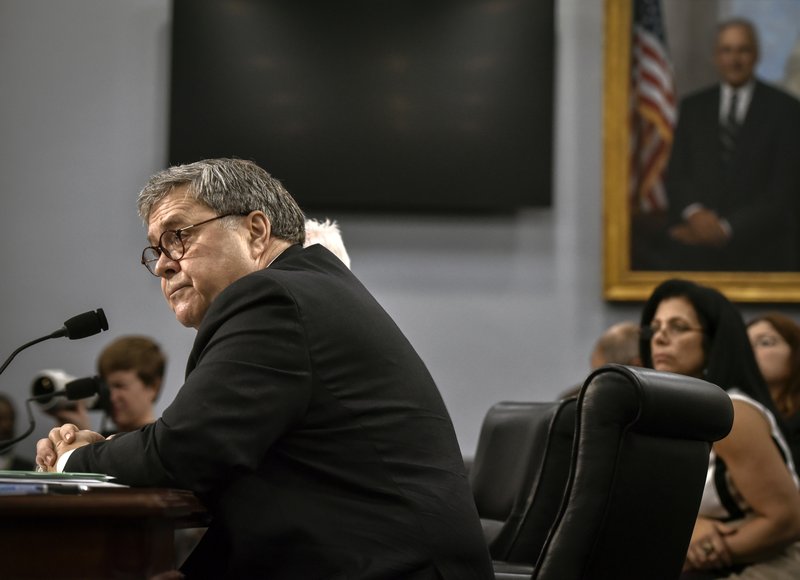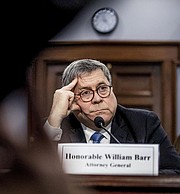WASHINGTON -- Attorney General William Barr testified Tuesday that he thinks he will be able to release special counsel Robert Mueller's report "within a week" and that he will color-code redacted information so the public will know why various material is being veiled.
The assertion came during an appearance before members of the House Appropriations Committee, where questions about Barr's handling of the report on whether Donald Trump's 2016 presidential campaign colluded with Russia dominated what otherwise would have been a routine budget hearing.
Over 2½ hours, Barr addressed a range of Democrats' concerns about Mueller's report, offering new details on how and why he quickly distilled and released its principal conclusions, and what he plans to do next.
Barr said that Mueller declined an opportunity to review the four-page letter he sent to Congress revealing the investigation's "bottom line" conclusions, although he conceded that Mueller's team might have preferred for the attorney general to have released more information initially.
He said he did not intend to ask a judge to allow him to release grand-jury material that Mueller generated, although he also said he did not anticipate shielding any elements because of executive privilege.
And -- having told lawmakers previously that his department was scrubbing the report with an eye on a mid-April release -- Barr confirmed the Justice Department was on course to make the report public.
"This process is going along very well, and my original timetable of being able to release this by mid-April stands, and I think that, from my standpoint, within a week I will be in a position to release the report to the public," Barr said.
Barr's handling of the nearly 400-page report has roiled Washington in recent weeks, with Democrats pressing to learn the full scope of what the special counsel's investigation found. His testimony seemed to do little to allay their fears, as lawmakers suggested afterward they would press ahead with legal action to compel him to turn over more than he now intends.
The House Appropriations Committee is not among those examining Trump, his finances and his foreign contacts, and only one member of the subcommittee that questioned Barr on Tuesday also sits on any of those panels that are. But Democrats on the House Judiciary Committee had provided members with a list of suggested questions, and as appropriators the lawmakers do have leverage: They could withhold or put conditions on the Justice Department's budget.
"I will consider whatever it takes to get people to see this report," said Rep. Jose Serrano, D-N.Y., chairman of the appropriations commerce, justice, science and related agencies subcommittee. "This report is too important to all of us."
Barr's four-page synopsis of Mueller's report said that the special counsel did not find that anyone in Trump's campaign conspired with Russia to interfere in the election and that Mueller did not reach a conclusion about whether Trump sought to obstruct justice. Barr wrote that he and Deputy Attorney General Rod Rosenstein weighed the evidence themselves and determined that they could not make a case that Trump obstructed justice.
Democrats have criticized that bare-bones description, and some on Mueller's team have told associates that they are frustrated with the limited information made available about their work.
Of Mueller's team, Barr conceded Tuesday, "I suspect that they probably wanted more put out." But he said he was "not interested in putting out summaries or trying to summarize because I think any summary, regardless of who prepares it, not only runs the risk of being under-inclusive or over-inclusive but also would trigger a lot of discussion and analysis that really should have weighed everything coming out at once."
Barr said that Mueller's team "did not play a role in drafting" his letter to Congress, but he added: "We offered to have Bob review it before putting it out, and he declined."
Barr, who received the report March 22 at the end of Mueller's 22-month investigation, said he rapidly revealed Mueller's conclusions because the public would not tolerate a weeks-long delay in knowing what the investigation had found.
"From a prosecutor's standpoint," he said, "the bottom line is binary, which is charges or no charges." Barr rejected the assertion that he could have quickly made public the summaries the special counsel's team prepared because all of the material contains grand-jury information, which by law cannot be released.
COLOR-CODED
Barr has told lawmakers that he will keep from public view grand-jury material, information that could reveal intelligence sources and methods, information that could affect ongoing investigations, and details that would affect the privacy of people "peripheral" to Mueller's investigation. He said Tuesday that he will color-code the redactions and provide "explanatory notes" so people know why various sections of the report are not being disclosed.
Mueller's team, Barr said, was "helping us select the information in the report that falls into those four categories."
He said that Congress will not receive the unredacted report but also that he had promised the Judiciary Committee that he would make himself available for interviews and "see if there's a way we can accommodate" requests for more information.
Democrats have urged Barr to make the case to a judge for an exception to the rules that prevent the Justice Department from releasing grand-jury information to Congress, but Barr said he has no plans to do so.
"The chairman of the Judiciary Committee is free to go to court if he feels one of those exceptions is applicable," Barr said. He added, "My intention is not to ask for it at this stage."
House Judiciary Committee Chairman Jerrold Nadler, D-N.Y., told reporters after Barr's testimony that he planned to ask the court to release grand-jury material because it is relevant to any preparation for potential impeachment proceedings.
"It's unfortunate that he won't join us," Nadler said, adding that he would subpoena Mueller's report "very quickly" if Barr continued to hold it back.
Similarly, House Intelligence Committee Chairman Rep. Adam Schiff, D-Calif., said he had made a "formal request" to the Justice Department "for all of the information and findings in the counterintelligence investigation."
During the hearing, House Appropriations Committee Chairman Nita Lowey, D-N.Y., challenged the attorney general on how he could have synthesized the nearly 400-page Mueller report into a four-page document so quickly, surmising "your mind must have already been made up."
Barr countered that Rosenstein had long been apprised of the course of Mueller's inquiry, and that he and Rosenstein had met with Mueller and his team March 5 to discuss the wind-down of the investigation.
"We had an inkling of what was coming in our direction," he said.
Barr said that the White House had not reviewed in advance his communications to Congress about the report, but he rebuffed Lowey's attempt to ask whether the White House had seen the report since he sent his summary letter.
"I've said what I'm going to say about the report today," he said.
When Lowey pressed him to say whether Trump had been "factually accurate" about claiming "complete and total exoneration," he similarly declined to engage.
"It's hard to have that discussion without the contents of the report, isn't it? And that's why I suggest we wait until the report is out," Barr told her.
Republicans defended Barr, with Alabama's Rep. Robert Aderholt comparing Democrats' questions to theories surrounding President John F. Kennedy's 1963 assassination. "So many of the questions here today have gone toward a grassy knoll conspiracy theory," Aderholt said.
Across the Capitol, Senate Majority Leader Mitch McConnell said he had no concerns with the handling of the report: "I think it really comes down to a question of whether you trust Bill Barr or not. And I do."
Barr also said the Justice Department inspector general intends to complete by May or June his investigation into aspects of the Russia inquiry, including whether law enforcement officials abused their surveillance powers to spy on a Trump campaign aide.
The inspector general, Michael E. Horowitz, has been examining how the FBI and Justice Department obtained a secret warrant in October 2016 to wiretap Carter Page, a former Trump campaign foreign policy adviser. Republicans have accused law enforcement officials of improperly obtaining the warrant because they relied in part on Democratic-funded opposition research compiled by Christopher Steele, a former British intelligence officer who was also an FBI informant, in seeking permission from the secretive Foreign Intelligence Surveillance Court to surveil Page.
As part of his investigation, Horowitz is also scrutinizing the FBI's relationship with Steele.
Barr also said he was studying the FBI's decision to begin investigating ties between Russia and Trump's campaign during the 2016 election. He said he was trying to get his "arms around all the aspects of the counterintelligence investigation."
Information for this article was contributed by Matt Zapotosky and Karoun Demirjian of The Washington Post; by Katie Benner, Nicholas Fandos and Charlie Savage of The New York Times; and by Eric Tucker, Mary Clare Jalonick, Chad Day, Michael Balsamo, Laurie Kellman and Matthew Daly of The Associated Press.
A Section on 04/10/2019

